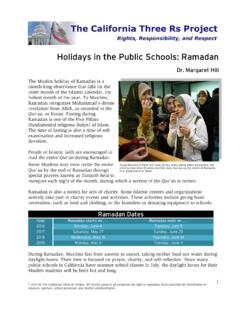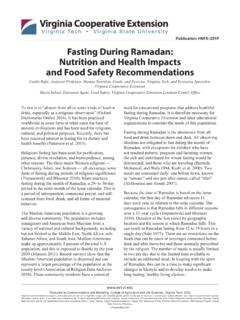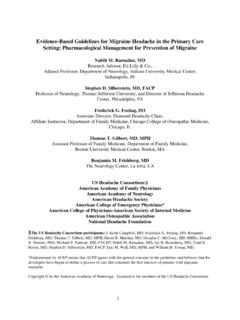Transcription of Prophet’s Sermon on Ramadan - AMDA
1 1 prophet s Sermon on Ramadan In today s Khutba, I want to share with you the Khutba, which our beloved prophet Muhammad (SAW) delivered on the last day of the month of Sha ban. The Khutba of the Messenger of Allah is concise, informative and educational. It provides instructional models to Muslims to be followed and to be practiced in their daily lives; especially during the month of Ramadan . Hopefully, it will develop in us a greater understanding behind the true meaning of Ramadan . Ibn Khuzaima, Ibn Hiban, and Imam al-Baihaqi reported on the authority of Salman al-Farsi (RA) that the Messenger of Allah (SAW) delivered a khutbah on the last day of the month of Sha ban, in which he (SAW) said: O People!
2 A great and blessed month has arrived for you with its mercies, blessings and forgiveness. Allah has decreed this month the best of all months. The days of this month are the best among the days and the nights are the best among the nights and its hours are the best among the hours. It is the month which invites you to be the guests of Allah and invites you to be one of those near to Him. Allah has honored you in it. In every breath you take is a reward of Allah. Your sleep is worship. Your good deeds are accepted and your invocations are answered. Therefore, you must invoke your Lord in all earnestness with hearts free from sin and evil, and pray that Allah may help you to keep fast, and to recite the Holy Qur an.
3 Indeed! Miserable is the one who is deprived of Allah s forgiveness in this great month. While fasting, remember the hunger and thirst on the Day of Judgment. Give alms to the poor and needy. Pay respect to your elders, have sympathy for your youngsters and be kind towards your relatives and kinsmen. Guard your tongue against unworthy words, and your eyes from scenes that are not worth seeing and your ears from sounds that should not be heard. Be kind to orphans so that if your children may become orphans they will also be treated with kindness. Do repent to Allah for your sins and supplicate with raised hands at the times of prayer as these are the best times, during which Allah Almighty looks at His servants with mercy.
4 Allah answers if they supplicate, responds if they call, grants if He is asked, and accepts if they entreat. O people! You have made your conscience the slave of your desires. Make it free by invoking Allah for forgiveness. Your back may break from the heavy load of your sins, so prostrate yourself before Allah for long intervals, and make this load lighter. Understand fully that Allah has promised in His Honor and Majesty that, people who perform salat and sajda (prostration) will be guarded from Hell-fire on the Day of Judgment. O people!, if anyone amongst you arranges for iftar meal for any believer, Allah will reward him as if he had freed a slave, and Allah will forgive him his sins.
5 A companion asked: but not all of us have the means to do so The prophet (SAW) replied: Keep yourself away from Hell-fire though it may consist of half a date or even some water if you have nothing else. O people! Anyone who during this month cultivates good manners will walk over the Sirat (bridge to Paradise) on the day when feet will tend to slip. For anyone who during this month eases the workload of his servants, Allah will make easy his accounting, and for anyone who doesn t hurt others during this month, Allah will safeguard him from His wrath on the Day of 2 Judgment. Anyone who respects and treats an orphan with kindness during this month, Allah shall look at him with kindness on that Day.
6 Anyone who treats his kinsmen well during this month, Allah will bestow His Mercy on him on that Day, while anyone who mistreats his kinsmen during this month, Allah will keep away from His Mercy. Whoever offers the recommended prayers during this month, Allah will save him from Hell, and whoever observes his obligations during this month, his reward will be seventy times the reward during other months. Whoever repeatedly invokes Allah s blessings on me, Allah will keep his scale of good deeds heavy, while the scales of others will be tending to lightness. Whoever recites during this month an ayah of the Holy Qur an, will get the reward of reciting the whole Qur an in other months.
7 O people! The gates of Paradise remain open during this month. Pray to your Lord that they may not be closed for you. The gates of Hell are closed, so pray to your Lord that they never open for you. Satan has been chained; so ask your Lord not to let him have power over you. Ali ibn Talib (RAA) said: I asked, O Messenger of Allah, what are the best deeds during this month ? He replied: O Abu-Hassan, the best of deeds during this month is to be far from what Allah has forbidden . Brothers and sisters, we should reflect upon this khutba. With Ramadan offering such unique opportunity to earn Allah s pleasure, what more can we ask for and what could be said about us if we didn t make use of this opportunity?
8 It is strange but true that there are among Muslims, different groups of people who have different attitudes toward Ramadan . There are those who see Ramadan as a time of restrictions and preventions; a time of prohibitions from desires and lust. They do not comprehend the benefits of Ramadan . They fast with great difficulty and continue to engage in backbiting, slandering, lying and other sins. They see fasting in Ramadan as nothing more than an obstacle in the way of their desires. Some others see the month of Ramadan as a month of food and drink. Most of their time is centered on making elaborate preparations for food. Ramadan somehow seems to increase their appetite, even though we know that consuming an excessive amount of food, especially at the time of iftar and suhoor causes indigestion, fatigue and laziness.
9 Some people actually gain weight in Ramadan . There are others who know nothing of Ramadan except that it is obligatory. Neither the days nor the nights are spent in worship; rather they might not even perform the five daily prayers. They awaken with Allah s displeasure and sleep with Allah s displeasure. Then there are those who restrict their worship and good deeds only to the month of Ramadan . They attend the Jumu ah prayer, frequent the Masjid, and spend in charity. But when the month is over all of those good deeds come to end, until the next Ramadan . Finally, there are those who cannot wait for the arrival of Ramadan . And when it comes they roll up their sleeves and they work as hard as they can. This month rejuvenates and strengthens them.
10 Let us evaluate ourselves. Which group do we belong to? May Allah (SWT) make us among those who take full opportunity of this blessed month. 3 A critical prerequisite for observing the month of Ramadan is that we first purify our intentions. While fasting has numerous virtues and benefits, the primary motivation of fasting should be solely to seek Allah s pleasure. In a well known hadith the prophet (SAW) had highlighted the conditions for fasting to be accepted by saying: Whoever fasts Ramadan out of faith and in the hope of reward, his previous sins will be forgiven.









